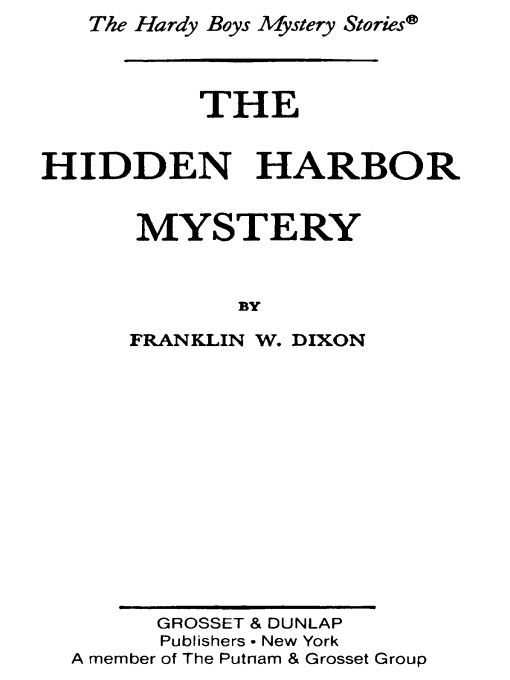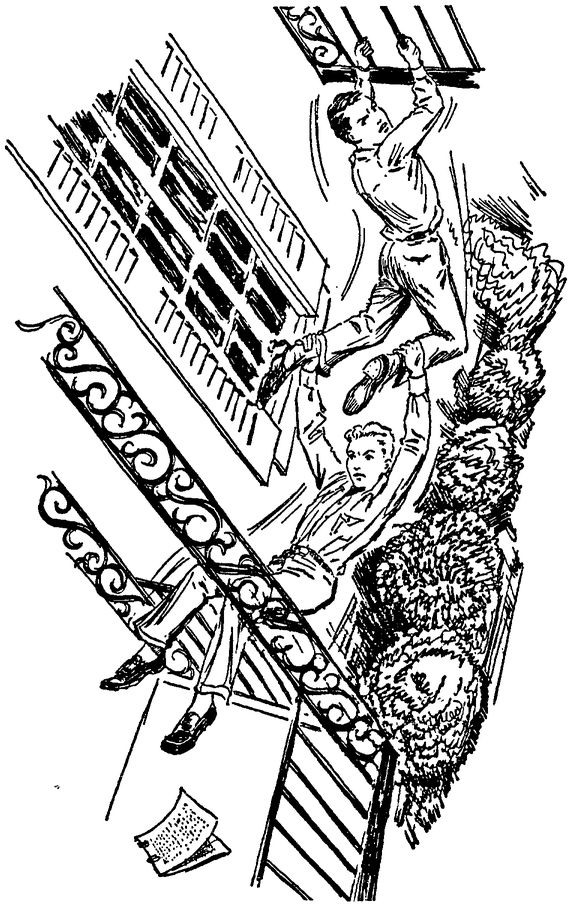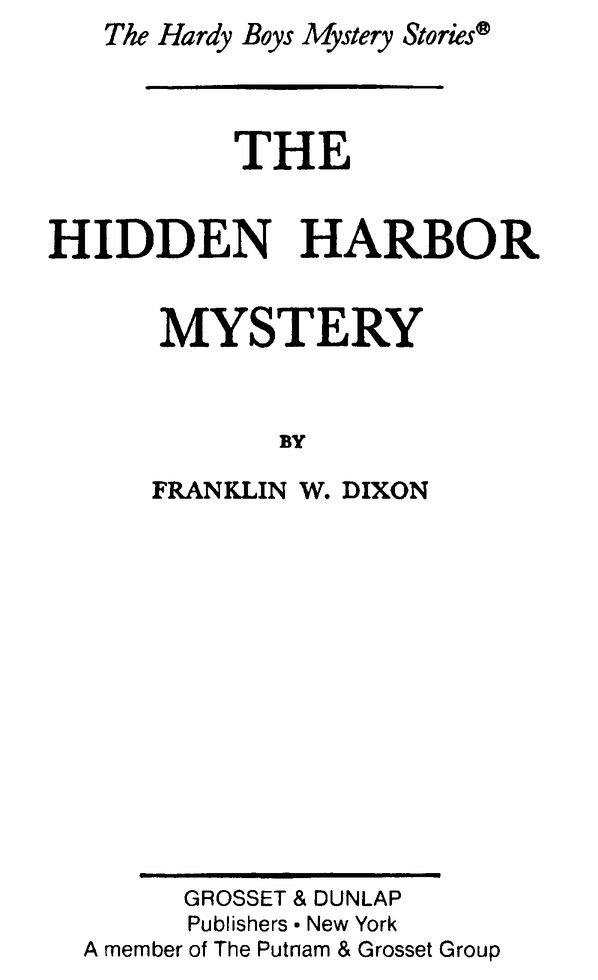The Hidden Harbor Mystery
Read The Hidden Harbor Mystery Online
Authors: Franklin W. Dixon


Table of Contents
Â
Â
Â

Joe gave a mighty swing, carrying both boys into the air

Copyright © 1990, 1962, 1935 by Simon & Schuster, Inc. All rights
reserved. Published by Grosset & Dunlap, Inc., a member of The Putnam &
Grosset Group, New York. Published simultaneously in Canada. S.A.
THE HARDY BOYS® is a registered trademark of Simon & Schuster, Inc.
GROSSET & DUNLAP is a trademark of Grosset & Dunlap, Inc.
Grosset Group, New York. Published simultaneously in Canada. S.A.
THE HARDY BOYS® is a registered trademark of Simon & Schuster, Inc.
GROSSET & DUNLAP is a trademark of Grosset & Dunlap, Inc.
eISBN : 978-1-101-07628-6
2008 Printing
CHAPTER I
The Libel Suit
“Wow! That fellow sure was in a hurry to get past us!” exclaimed Joe Hardy, who had been pushed against the railing of the cruise ship's gangplank.
“Practically knocked us overboard!” agreed his brother Frank.
The two boys, descending the gangplank from the brightly lighted deck, looked curiously after the young man who had shoved them aside.
Joe, fair-haired and seventeen, and dark-haired Frank, a year older, heard the stranger cry out to a deck attendant:
“I tell you, I
must
come aboard!”
must
come aboard!”
“Sorry, sir,” was the firm answer. “It's past midnight. We sail at dawn. No more visitors.”
The Hardys continued down to the pier. Suddenly they stopped and whirled. The visitor was saying excitedly, “I must see Mr. Hardy before he sails!”
“Maybe it's about a mystery,” Frank remarked.
The brothers had just said good-by to their parents, the well-known detective, Fenton Hardy, and his wife Laura, who were leaving from New York City on a Caribbean cruise. Mr. Hardy was making a combination business and pleasure trip, since he planned to see a client in Jamaica.
While Frank and Joe listened intently to the conversation on deck, a powerfully built man came from behind a stack of baggage and sauntered to the foot of the gangway. The Hardys' attention was attracted by the man's heavy, wheezy breathing and his flat face turned upward to the deck.
“All right, all right. I give up,” came the dejected voice of the stranger above. As he came down the gangplank, the rough-looking man gave him a swift glance, then shuffled off quickly.
By now the young man had reached the pier. He was slim in build, with reddish-brown hair. Nervously he kept slapping his palm with a rolled-up newspaper, as if in utter frustration.
“Excuse me,” said Frank, stepping in front of him. “We heard you mention Fenton Hardy. We're his sons, Frank and Joe.”
“You are?” The man's eyes brightened. He had a soft, slow way of speaking that marked him as a Southerner.
“I just about knocked myself out, trying to speak to your father,” he continued. “I have a case he must handle!”
“He won't be back for ten days,” said Frank.
“I know.” The young fellow sighed. “I called your home in Bayport. A Miss Hardy there told me about the cruise but begged me not to pester your father!”
“That's Aunt Gertrude.” Joe chuckled.
“I rushed here to New York, thinking I might at least talk to him for an hour,” the man went on. “You see, I've read in the newspapers of Mr. Hardy's great successesâ”
The stranger paused, apparently suddenly recalling something.
“I've also read,” he continued, “that his sons often help him out, and that they have solved some tough cases on their own. How about it? Would you all be willing to help me?”
“We'd like to. But,” Joe replied doubtfully, “we've promised to go camping soon with a buddy.”
“Let's hear your case, anyway,” Frank suggested eagerly. “Maybe we can take it, Mr.â”
“I'm Bart Worth,” the man said, his face showing relief. He looked about him.
“Is there a place near here where we can eat and talk?” he asked. “I was in such a hurry to catch your dad before he sailed I didn't have time for my supper.”
“Sure. We'll listen while you eat,” Joe said.
The Hardys led Mr. Worth up a side street. They stopped at a wide, steamy window bearing the lettering:
CHARLIE'S CLAM HOUSE
“I hear the food's good,” Joe remarked, and the trio entered the restaurant.
It was a typical waterfront eating place, with sawdust on the floor. The place was crowded with diners, despite the late hour. In one corner sat a group of well-dressed people who, like the Hardys, had just left a farewell party on board the liner. But most of the customers were rough-looking men of the waterfront district. The noise of lively conversations and the odor of frying fish filled the air.
Frank, Joe, and Bart Worth seated themselves at a plain wooden table in the middle of the room. As soon as the waiter had taken a dinner order for Mr. Worth and sandwiches for the Hardys, the Southerner began his story.
“I'm owner, publisher, and editor of the
Larch
mont Record. You all probably never heard of us, but it's the only newspaper in the town of Larchmont, Georgia, on the Atlantic coast. Pretty soon there won't be any Record, though, if a certain man named Samuel Blackstone has his way!”
Larch
mont Record. You all probably never heard of us, but it's the only newspaper in the town of Larchmont, Georgia, on the Atlantic coast. Pretty soon there won't be any Record, though, if a certain man named Samuel Blackstone has his way!”
“How so?” Joe queried, as he and Frank leaned forward, deeply interested.
“Mr. Blackstone's suing me for libel,” Worth answered. “He”s about the wealthiest businessman in Larchmontâthe leading citizen.“
“So his influence is considerable?” Frank prompted.
“You might say he about runs the town,” admitted Bart Worth. “Besides, he's trying to ruin me and my newspaper.”
“Why? Does Mr. Blackstone have a grudge against you?” Joe asked.
“I'll tell you more about Blackstone first,” said the editor. “He lives on a large estate which is only half the original Blackstone property. Professor Ruel Rand, another Blackstone descendant, lives on the other half in the old family mansion. Clement Blackstone, the great-grandfather of both men, started the whole trouble. In his will, he divided the plantation between his son Benjamin and his daughter Blanche, who married a Rand. The difficulty began with the boundary line he set up.”
Using a paper napkin, Bart Worth made a quick sketch.
“The only landmark mentioned in the will to indicate the property line was âthe great oak beside the big pond,' ” the newspaperman pointed out. “Unfortunately there were
two
great oaksâone on either side of the pond.”
two
great oaksâone on either side of the pond.”
“So both heirs claimed the pond!” Joe deduced.
“You've hit it exactly. The heirs bickered and feuded and went to court for years, but nothing was ever settled. Finally, in the time of Samuel Blackstone's grandfather, they gave up the dispute. Nobody in the family was interested in the pond any more. The Blackstones went into business and made money, and the Randsâwell, they've been going downhill financially ever since. The old plantation house is pretty run-down now, although I guess Professor Rand doesn't mind it, being a bachelor.”
“What about the libel suit, Mr. Worth?” Frank asked, intrigued.
“Well, a few weeks ago, I heard a rumor that Professor Rand had become interested in the disputed property all of a sudden, and that the old feud was on again!”
“You couldn't print a rumor, of course,” Frank observed.
“No,” the editor agreed, “but I went to the courthouse, where I learned that Rand had come in to examine old Clement's will. Then Jenny Shringle came to see me. Jenny's a seamstress, who worked many years for the Blackstones. Samuel's wife, who had been very fond of her, died about two years ago. Recently Jenny was discharged. Just before that, she told me she had personally overheard a quarrel between Blackstone and Professor Rand over the pond. Well, I acted very cautiously. I simply wrote a story that there was a rumor circulatingânothing more. That was a true fact, you see.”
“And it's not libelous,” Frank commented. “So you shouldn't have any problem there.”
“That's not all,” said the editor with increasing agitation. “When the story appeared in the
Record
it mentioned
another
rumorâa rumor that the Blackstone family fortune had been built on smuggling, and receiving stolen goods from pirates!”
Record
it mentioned
another
rumorâa rumor that the Blackstone family fortune had been built on smuggling, and receiving stolen goods from pirates!”
“You didn't put that in?” Frank asked quickly.
“I certainly didnât!” Bart Worth exclaimed. “I wrote the original story myself. Everyone on my staff denies changing it. This pirate rumor has been common talk around Larchmont for years. Now that it's been printed in my paper, though, Blackstone is suing. He's touchy and proudâvain of his family's position. My only chance is to prove that the pirate rumor is true, which I honestly believe it is. If you fellows can't help me do that, I'll lose my newspaper!”
“Why not just apologize?” Frank asked. “Can't you explain things to Mr. Blackstone?”
The editor shook his head. “No. I've opposed his views and policies in the past in my paper, which has infuriated him. Now he has a motive for destroying it. Besides”âhere the young man looked up with fire in his eyesâ“Samuel Blackstone has called me a liar. I don't take that from anyone without a fight! And if he succeeds in ruining the Record, he'll have Larchmont completely bullied.”
Just then the waiter arrived with the food. While the editor went to wash his hands, Joe sounded his brother out:
“What do you think? Shall we take the case?”
“I don't like it,” Frank answered thoughtfully. “After all, this apparent libel was printed in Worth's paper. His claim that he doesn't know how it got there seems pretty weak. An editor
should
know what comes off his press.”
should
know what comes off his press.”
“You don't trust him?”
“I think we should know more about this business before we commit ourselves, that's all,” Frank declared.
Other books
Draugr by Arthur Slade
Death of a Garage Sale Newbie by Sharon Dunn
Damaged Goods (Don't Call Me Hero Book 2) by Eliza Lentzski
Berlin Diary by William L. Shirer
The Love Letter by Brenna Aubrey
Maxed Out by Daphne Greer
Ahogada en llamas by Jesús Ruiz Mantilla
The Cinderella Murder by Mary Higgins Clark, Alafair Burke
The Boy on the Porch by Sharon Creech
With This Kiss: Part Two by Eloisa James